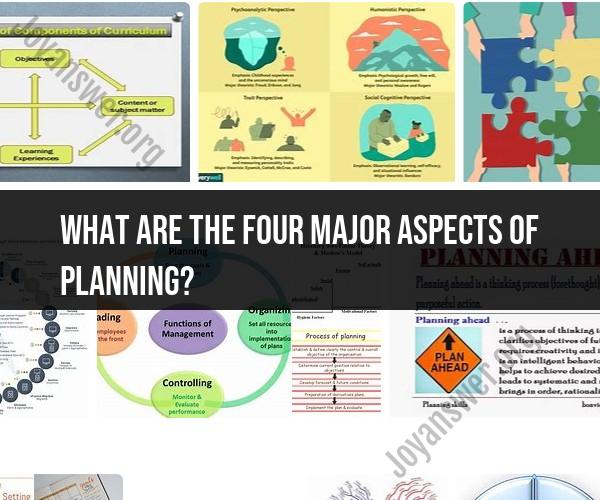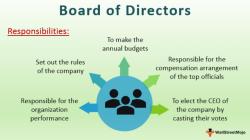What are the four major aspects of planning?
Planning is a fundamental process that involves setting objectives and determining the actions needed to achieve those objectives. There are four major aspects or key components of planning:
Setting Objectives or Goals:
- The first step in the planning process is to establish clear and specific objectives or goals. These objectives should be SMART: Specific, Measurable, Achievable, Relevant, and Time-bound. SMART goals provide a clear direction and criteria for success.
- Objectives can be long-term or short-term, and they serve as the foundation for the entire planning process. They help organizations and individuals focus on what they want to achieve.
Identifying Alternatives or Courses of Action:
- After setting clear objectives, planners need to identify various alternatives or courses of action that can help in achieving those objectives. This involves brainstorming and evaluating different strategies or approaches.
- The alternatives considered should align with the goals and should be assessed for their feasibility, cost-effectiveness, and potential risks or benefits.
Evaluating and Selecting Alternatives:
- Once a range of alternatives is identified, the next step is to evaluate and compare these options. This involves a thorough analysis of the pros and cons of each alternative, considering factors like cost, time, resources, and potential outcomes.
- Planners must select the most suitable and practical alternative that aligns with the established objectives and offers the best chance of success.
Implementing and Monitoring the Plan:
- After selecting the best course of action, it's time to implement the plan. This involves putting the chosen strategy into action, allocating resources, and assigning responsibilities.
- Monitoring and controlling the plan is an ongoing process that involves tracking progress, measuring performance against the established goals, and making necessary adjustments. Monitoring ensures that the plan remains on track and allows for corrective actions when deviations occur.
These four major aspects of planning provide a structured framework for making informed decisions and achieving desired outcomes. Effective planning is essential in various contexts, including business management, project management, personal goal setting, and more. It helps individuals and organizations allocate resources efficiently, adapt to changing circumstances, and work toward their desired future state.
The Four Pillars of Planning: A Comprehensive Guide
The four pillars of planning are a set of core principles that can be applied to any planning process. They are:
- Goals: What do you want to achieve?
- Objectives: What are the specific steps you need to take to achieve your goals?
- Strategies: How will you achieve your objectives?
- Evaluation: How will you measure your progress and success?
The four pillars of planning are essential for any successful planning process. By focusing on these four key areas, you can develop and implement a plan that is more likely to be effective.
Essential Aspects of Effective Planning: Exploring the Four Major Components
The four pillars of planning are essential aspects of effective planning. Here is a closer look at each component:
- Goals: The first step in any planning process is to define your goals. What do you want to achieve? What is your desired outcome? Once you know your goals, you can develop a plan to achieve them.
- Objectives: Objectives are the specific steps you need to take to achieve your goals. They should be specific, measurable, achievable, relevant, and time-bound.
- Strategies: Strategies are the methods you will use to achieve your objectives. They should be aligned with your goals and objectives, and they should be realistic and achievable.
- Evaluation: Evaluation is the process of measuring your progress and success. It is important to evaluate your plan regularly to ensure that you are on track and to make adjustments as needed.
Successful Planning Strategies: Focusing on the Four Key Aspects
To develop and implement a successful planning strategy, it is important to focus on the four key aspects of effective planning:
- Set clear and achievable goals. What do you want to achieve? What is your desired outcome?
- Develop specific and measurable objectives. What steps do you need to take to achieve your goals? How will you measure your progress?
- Create realistic and achievable strategies. How will you achieve your objectives? What methods will you use?
- Evaluate your plan regularly. Are you on track to achieve your goals? Do you need to make any adjustments?
By focusing on these four key aspects, you can develop and implement a planning strategy that is more likely to be successful.
Here are some additional tips for successful planning:
- Be flexible. Things don't always go according to plan. Be prepared to make adjustments as needed.
- Involve others. Planning is often more effective when it is a collaborative process. Involve others who are affected by the plan in the planning process.
- Communicate effectively. Communicate your plan to others and keep them updated on your progress.
- Celebrate successes. It is important to celebrate your successes along the way. This will help you to stay motivated and on track.
Planning is an essential skill for success in all areas of life. By following the four pillars of planning, you can develop and implement a plan that is more likely to be effective.












